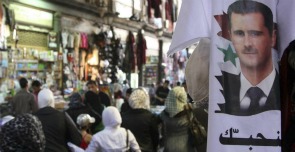A shirt for sale at a market in Damascus shows Syrian President Bashar Al Assad Amnesty for all prisoners who have "committed crimes before" today and halving of sentences involving prison. These are the rules to be adopted today by a decree by Syrian President Bashar Al Assad. The document also covers the Presidential members of the movement of the 'Muslim Brothers', an organization outlawed in 1980 and whose membership shall be punished with the death penalty.
After the sentences to the international regime for the violent suppression of protests, the Syrian government acknowledged today - for the first time in decades - the existence of political prisoners in the jails of the country. An implicit admission, in the second package of reforms adopted by the Bureau, and that includes "the issue of political prisoners," according to a statement by the government.
According to the Syrian and international humanitarian organizations, before the demonstrations were at least 3 thousand political prisoners in Syria. From mid-March to date, according to humanitarian sources, more than 10 thousand innocent civilians arrested because he had publicly expressed their disapproval.
Today is the second amnesty promulgated by Syrian head of state in two months. In April, Assad issued an amnesty for minor crimes, including theft, forgery and military desertion. But if the system chooses the one hand the political path, the other continues in the country's repression of the protests.
According to witnesses, the Syrian army is firing with artillery and tanks against Rastan, location near Homs in central Syria. The residents, for the first time since the beginning of the events, they decided to fire the soldiers with shotguns. But the residents denied, through the information disseminated by activists on Twitter.
Also in the central area of the country, at least 15 soldiers involved in the repression of the protests were deserted. Meanwhile, back in Syria are a thousand 3 thousand of refugees who fled two weeks ago in northern Lebanon from the Sunni town of Tall Kalakh. The decision came "after a member of the City Council of Tall Kalakh visited Wadi Khaled and reassured the refugees on their safe return," says Rami Khazzal, Muqlaybe mayor, a town on the Lebanese border region of Wadi Khaled where they had Syrian refugees refugees.
2 thousand refugees remain in Lebanon. "The humanitarian crisis continues - is the appeal of Khazzal -, someone has to help us." 


After the sentences to the international regime for the violent suppression of protests, the Syrian government acknowledged today - for the first time in decades - the existence of political prisoners in the jails of the country. An implicit admission, in the second package of reforms adopted by the Bureau, and that includes "the issue of political prisoners," according to a statement by the government.
According to the Syrian and international humanitarian organizations, before the demonstrations were at least 3 thousand political prisoners in Syria. From mid-March to date, according to humanitarian sources, more than 10 thousand innocent civilians arrested because he had publicly expressed their disapproval.
Today is the second amnesty promulgated by Syrian head of state in two months. In April, Assad issued an amnesty for minor crimes, including theft, forgery and military desertion. But if the system chooses the one hand the political path, the other continues in the country's repression of the protests.
According to witnesses, the Syrian army is firing with artillery and tanks against Rastan, location near Homs in central Syria. The residents, for the first time since the beginning of the events, they decided to fire the soldiers with shotguns. But the residents denied, through the information disseminated by activists on Twitter.
Also in the central area of the country, at least 15 soldiers involved in the repression of the protests were deserted. Meanwhile, back in Syria are a thousand 3 thousand of refugees who fled two weeks ago in northern Lebanon from the Sunni town of Tall Kalakh. The decision came "after a member of the City Council of Tall Kalakh visited Wadi Khaled and reassured the refugees on their safe return," says Rami Khazzal, Muqlaybe mayor, a town on the Lebanese border region of Wadi Khaled where they had Syrian refugees refugees.
2 thousand refugees remain in Lebanon. "The humanitarian crisis continues - is the appeal of Khazzal -, someone has to help us."



No comments:
Post a Comment